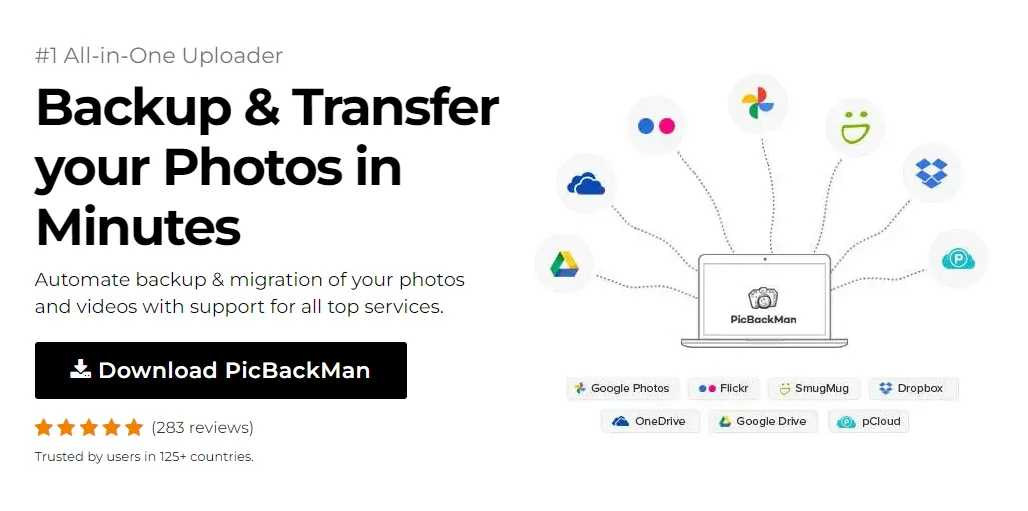Why is it the #1 bulk uploader?
- Insanely fast!
- Maintains folder structure.
- 100% automated upload.
- Supports RAW files.
- Privacy default.
How can you get started?
Download PicBackMan and start free, then upgrade to annual or lifetime plan as per your needs. Join 100,000+ users who trust PicBackMan for keeping their precious memories safe in multiple online accounts.
“Your pictures are scattered. PicBackMan helps you bring order to your digital memories.”
How to backup photos online?

Losing precious photos can be heartbreaking. Whether it's vacation snapshots, family gatherings, or once-in-a-lifetime moments, these digital memories deserve protection. Learning how to backup photos online provides security against device failures, theft, or accidental deletions. This comprehensive guide walks you through everything you need to know about safeguarding your photo collection in the digital cloud.
Why Backing Up Photos Online Matters
Before jumping into the methods, let's understand why online photo backups are essential:
- Protection against hardware failures (like crashed hard drives)
- Security if your devices are lost, stolen, or damaged
- Access to your photos from anywhere with internet connection
- Easy sharing capabilities with friends and family
- Long-term preservation of important memories
A 2022 study showed that over 60% of people have lost important digital files at some point, with photos being the most regretted loss. Don't become part of that statistic!
Best Online Photo Backup Options in 2023
Let's explore the top services for backing up your precious photo memories:
| Service | Free Storage | Paid Plans Starting At | Best For |
|---|---|---|---|
| Google Photos | 15GB (shared with Google Drive) | $1.99/month for 100GB | Everyday users, Android users |
| iCloud | 5GB | $0.99/month for 50GB | Apple ecosystem users |
| Dropbox | 2GB | $9.99/month for 2TB | Cross-platform users, file organization |
| Amazon Photos | 5GB (Unlimited for Prime members) | Included with Prime ($14.99/month) | Amazon Prime subscribers |
| OneDrive | 5GB | $1.99/month for 100GB | Microsoft/Windows users |
| Flickr | 1,000 photos | $8.25/month for unlimited | Photographers, sharing-focused users |
How to Backup Photos to Google Photos
Google Photos remains one of the most popular options for photo backups due to its ease of use and powerful features.
Setting Up Google Photos on Your Smartphone
- Download the Google Photos app from your app store
- Sign in with your Google account
- Tap your profile picture in the top right
- Select "Photos settings"
- Tap "Backup & sync"
- Toggle the switch to turn on automatic backups
- Choose your upload quality (Storage saver or Original quality)
Backing Up Photos from Your Computer to Google Photos
- Visit photos.google.com in your browser
- Sign in with your Google account
- Click "Upload" in the top right corner
- Select "Computer" from the dropdown menu
- Choose the photos you want to upload
- Click "Open" to begin the upload process
Managing Your Google Photos Storage
Google provides 15GB of free storage shared across Gmail, Google Drive, and Google Photos. To manage your storage:
- Go to photos.google.com
- Click on your profile picture and select "Manage storage"
- Review large photos and videos that take up space
- Delete unwanted items to free up storage
- Consider purchasing additional storage if needed
How to Backup Photos to iCloud
For Apple users, iCloud provides seamless integration across all your devices.
Setting Up iCloud Photos on iPhone or iPad
- Open "Settings" on your device
- Tap your name at the top
- Select "iCloud"
- Tap "Photos"
- Turn on "iCloud Photos"
- Choose either "Optimize iPhone Storage" or "Download and Keep Originals"
Setting Up iCloud Photos on Mac
- Open the Photos app on your Mac
- Click "Photos" in the menu bar
- Select "Preferences"
- Click the "iCloud" tab
- Check "iCloud Photos"
- Choose your storage optimization preference
Managing Your iCloud Storage
Apple offers 5GB of free iCloud storage. To manage it:
- Go to "Settings" and tap your name
- Select "iCloud" then "Manage Storage"
- Review your storage usage
- Delete unwanted backups or data
- Upgrade your storage plan if needed
How to Backup Photos to Dropbox
Dropbox offers excellent cross-platform compatibility and organization features.
Setting Up Automatic Photo Uploads on Mobile
- Download and install the Dropbox app
- Sign in to your account
- Tap the "Account" icon (usually your profile picture)
- Go to "Settings"
- Select "Camera Uploads"
- Toggle on "Camera Uploads" to automatically back up photos
- Choose whether to use cellular data or Wi-Fi only
Uploading Photos to Dropbox from Computer
- Install the Dropbox desktop app or visit dropbox.com
- Sign in to your account
- Click the "Upload" button
- Select "Files" or "Folder" depending on what you want to upload
- Choose the photos you wish to back up
- Click "Open" to begin uploading
How to Backup Photos to Amazon Photos
Amazon Photos offers unlimited full-resolution photo storage for Prime members, making it an excellent value.
Setting Up Amazon Photos on Mobile
- Download the Amazon Photos app from your app store
- Sign in with your Amazon account
- Follow the prompts to enable auto-save
- Tap the menu icon and go to "Settings"
- Under "Auto-Save," ensure the feature is turned on
- Choose your upload preferences (Wi-Fi only or cellular data too)
Uploading Photos to Amazon Photos from Computer
- Visit amazon.com/photos
- Sign in with your Amazon account
- Click "Add" and select "Upload Photos"
- Choose the photos you want to upload
- Click "Open" to begin the upload
How to Backup Photos to Microsoft OneDrive
OneDrive integrates well with Windows devices and offers affordable storage options.
Setting Up OneDrive Photo Backup on Mobile
- Download the OneDrive app from your app store
- Sign in with your Microsoft account
- Tap the "Me" icon at the bottom
- Select "Settings"
- Tap "Camera Upload"
- Toggle on "Camera Upload" to enable automatic backups
- Choose your upload quality and network preferences
Backing Up Photos to OneDrive from Windows PC
- Open File Explorer on your Windows computer
- Navigate to the OneDrive folder
- Create a folder for your photos if desired
- Drag and drop photos from your computer into the OneDrive folder
- Wait for the sync icon to show they've been uploaded
Creating a Multi-Service Backup Strategy
For maximum protection, consider using multiple services to back up your most precious photos.
The 3-2-1 Backup Rule for Photos
Follow this expert-recommended strategy:
- 3 - Keep at least three copies of your photos
- 2 - Store them on two different types of media (e.g., computer hard drive and cloud storage)
- 1 - Keep one copy off-site (cloud storage fulfills this requirement)
Sample Multi-Service Strategy
Here's an example of a robust photo backup strategy:
- Primary backup: Google Photos or iCloud for all photos
- Secondary backup: External hard drive for your complete photo library
- Tertiary backup: Another cloud service like Amazon Photos for your most precious images
Quick Tip to ensure your videos never go missing
Videos are precious memories and all of us never want to lose them to hard disk crashes or missing drives. PicBackMan is the easiest and simplest way to keep your videos safely backed up in one or more online accounts.
Simply download PicBackMan (it's free!), register your account, connect to your online store and tell PicBackMan where your videos are - PicBackMan does the rest, automatically. It bulk uploads all videos and keeps looking for new ones and uploads those too. You don't have to ever touch it.
Automating Your Photo Backups
Setting up automatic backups ensures you never forget to protect new photos.
Mobile Auto-Backup Settings
Most cloud services offer automatic backup options for mobile devices. Generally, you'll want to:
- Enable auto-backup in your chosen app's settings
- Set it to back up only when connected to Wi-Fi to save data
- Allow background app refresh for your backup app
- Keep sufficient free space on your cloud account
Desktop Auto-Backup Solutions
For computer photos, consider these automation options:
- Use desktop sync clients provided by your cloud service
- Set up folder monitoring to automatically upload new photos
- Schedule regular backups using built-in tools like Windows Backup or Time Machine for Mac
- Configure backup software to run during off-hours
Organizing Your Online Photo Backups
A good organization system makes finding and managing your photos easier.
Folder Structures for Photo Backups
Consider organizing your photos using this structure:
- Year (e.g., 2023)
- Within each year, create month folders (01-January, 02-February)
- Within each month, create event folders (Birthday, Vacation, etc.)
Using Tags and Albums
Most cloud services offer tagging and album features:
- Create albums for specific events or categories
- Use tags for people, places, or themes
- Take advantage of automatic face recognition where available
- Add descriptive titles to help with searching later
Security Considerations for Online Photo Backups
Protecting your photos from unauthorized access is crucial.
Securing Your Cloud Accounts
- Use strong, unique passwords for each cloud service
- Enable two-factor authentication whenever available
- Regularly review third-party apps with access to your accounts
- Log out when using shared computers
- Check account activity regularly for suspicious logins
Privacy Settings for Your Photos
Manage who can see your backed-up photos:
- Review default sharing settings in your cloud service
- Disable public sharing unless specifically needed
- Check if your service offers private folders for sensitive photos
- Be cautious with automatic social media sharing features
Handling Special Photo Types
Different types of photos may require special handling.
RAW Photo Files
Professional photographers often shoot in RAW format, which requires special considerations:
- Check if your chosen service supports RAW files (many don't)
- Consider specialized services like SmugMug or Flickr Pro
- Be aware that RAW files are much larger than JPEGs
- Some services may convert RAW to JPEG during upload
Live Photos and Videos
For Apple Live Photos, burst shots, and videos:
- Verify that your service preserves Live Photo functionality
- Be aware that videos typically count against storage limits
- Check if your service compresses video quality
- Consider dedicated video backup services for large video collections
Dealing with Limited Internet Connections
Slow or metered internet connections can make photo backups challenging.
Optimizing Uploads on Slow Connections
- Schedule uploads during off-peak hours
- Limit the number of photos uploaded at once
- Consider lower quality settings if full resolution isn't essential
- Use desktop apps that can resume interrupted uploads
Backing Up Photos with Limited Data Plans
- Set services to upload only when connected to Wi-Fi
- Use libraries or public Wi-Fi for large uploads
- Consider physical backup methods like external drives for initial large backups
- Prioritize your most important photos if you can't back up everything
Restoring Photos from Online Backups
Knowing how to retrieve your photos is just as important as backing them up.
How to Download Photos from Cloud Services
General steps for most services:
- Log in to your cloud service
- Select the photos you want to download
- Look for a download button or option
- Choose download location on your device
- For large collections, look for batch download or export options
Recovering Deleted Photos
Most cloud services offer recovery options:
- Check the "Trash" or "Recently Deleted" folder in your service
- Be aware of time limits (many services automatically delete from trash after 30 days)
- Look for "Restore" options
- Contact customer support for help with accidentally deleted photos
Comparing Online Photo Backup Methods
Let's compare the main approaches to online photo backup:
| Backup Method | Pros | Cons | Best For |
|---|---|---|---|
| Cloud Storage Services (Google Drive, Dropbox) |
- Multi-purpose storage - Good file organization - Often includes collaboration features |
- Limited free storage - Fewer photo-specific features - May not preserve metadata |
Users who need to store various file types, not just photos |
| Photo-Specific Services (Google Photos, iCloud Photos) |
- Photo organization features - Search by people, places, things - Often includes editing tools |
- May compress photos - Primarily focused on consumer photos - Limited file type support |
Casual photographers wanting easy organization |
| Professional Photo Services (SmugMug, Flickr Pro) |
- Full-resolution storage - RAW file support - Portfolio features |
- Higher cost - Learning curve - Overkill for casual users |
Professional photographers and serious hobbyists |
| Social Media (Facebook, Instagram) |
- Easy sharing - Free to use - Built-in community |
- Heavy compression - Privacy concerns - Not designed as backup solutions |
Photos meant primarily for sharing, not archiving |
Troubleshooting Common Photo Backup Issues
Even with the best services, you might encounter problems. Here's how to solve common issues:
Uploads Not Completing
- Check your internet connection stability
- Ensure you have sufficient storage space in your account
- Try uploading smaller batches of photos
- Restart the app or your device
- Check if file sizes exceed service limits
Missing Photos After Backup
- Verify sync settings are correct
- Check if photos are in a different folder than expected
- Look for filtering options that might be hiding photos
- Ensure the backup completed successfully
- Check trash/recently deleted folders
Duplicate Photos in Backups
- Check for duplicate upload settings
- Look for "skip duplicates" options in your service
- Use the service's duplicate detection tools if available
- Consider third-party duplicate photo finders
Cost-Effective Photo Backup Strategies
Backing up photos doesn't have to be expensive. Here are some budget-friendly approaches:
Maximizing Free Storage Tiers
- Use multiple free services for different photo collections
- Take advantage of promotional storage offers
- Regularly clean up unwanted photos to stay within free limits
- Consider lower-resolution backups for less important photos
Finding the Best Value in Paid Plans
- Look for annual payment discounts (often 15-20% savings)
- Consider family plans if multiple people need storage
- Watch for seasonal promotions and discounts
- Compare the true cost per GB across services
Conclusion: Creating Your Personal Photo Backup Plan
Backing up your photos online is one of the smartest digital habits you can develop. By following the steps outlined in this guide, you can ensure your precious memories remain safe regardless of what happens to your devices. Remember that the best backup system is one you'll actually use consistently – so choose services that fit your needs, budget, and technical comfort level.
Start with one service, set up automatic backups, and gradually build a more comprehensive system if needed. The peace of mind that comes from knowing your photo memories are secure is well worth the small investment of time and potentially money.
Don't wait until after a disaster to think about backups. Set up your online photo backup system today, and you'll thank yourself later when the unexpected happens.
Frequently Asked Questions
1. How much online storage do I need for my photos?
The amount of storage needed depends on how many photos you have and their resolution. As a rough guide, modern smartphone photos are typically 2-5MB each, so 1,000 photos would require 2-5GB of storage. If you take photos with a DSLR camera or store in RAW format, each photo could be 20-50MB. Calculate your current collection size and add extra space for future photos.
2. Is it safe to delete photos from my phone after backing them up online?
Yes, but only after confirming they've been successfully backed up. Check that your photos appear in your online storage service and download a few test photos to verify quality. For extra safety, consider keeping especially important photos on your device even after backup, or back them up to multiple services before deleting.
3. Will my photos lose quality when backed up online?
It depends on the service. Some services like Google Photos offer a "Storage saver" option that compresses photos to save space, which can reduce quality slightly. Other services like Dropbox, Amazon Photos (for Prime members), and iCloud Photos store your photos in their original quality. Check the settings of your chosen service and select "original quality" or similar options if maintaining exact quality is important to you.






